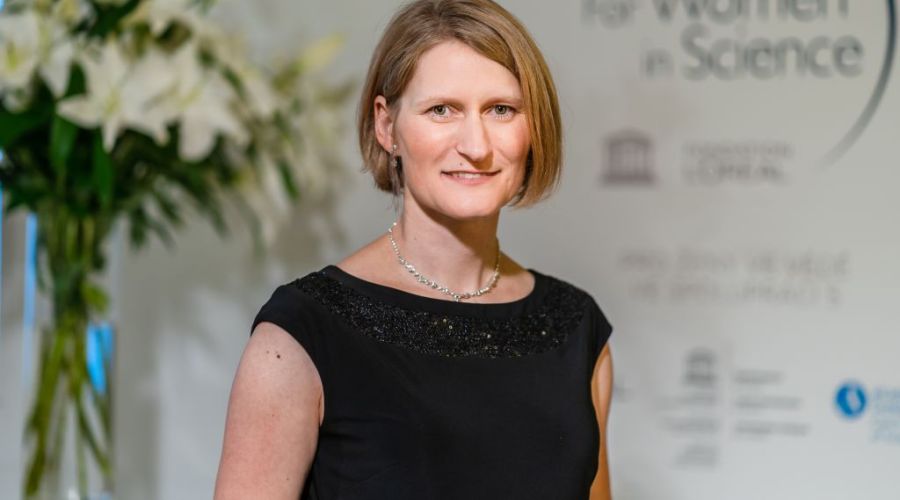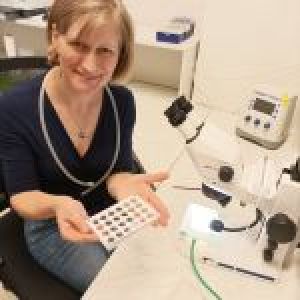Dr Fenckova from FSC USB has joined the prestigious multidisciplinary international network of FKNE scientists

The FENS-Kavli Network of Excellence (FKNE) is a dynamic and highly prestigious group of 30 outstanding early and mid-career European neuroscientists who are selected for their scientific excellence, originality and leadership. One of the selected top scientists is now Mgr. Michaela Fenckova, Ph.D., from the Department of Molecular Biology and Genetics, Faculty of Science, University of South Bohemia in České Budějovice.
FKNE was founded in 2014 as a collaboration between the Federation of European Neuroscience Societies (FENS) and The Kavli Foundation. This year, a new group of 15 fellows was selected, representing 10 different European countries. These new FKNE Fellows will join 15 other representatives from 2021 to form an active network of 30 scientists based in 15 different countries. FKNE members are selected for 2 two-year terms, after which they become members of the growing FKNE Alumni network.
‘The selection of the 2023 scientists was an incredibly challenging task, which is a testament to the exceptional talent of Europe's young neuroscience community. We are proud to announce the candidates who have been selected for this fellowship programme and who stand out for their brilliance and leadership,’ says Professor Flavio Donato, Chair of the 2023 selection committee.
This multidisciplinary international network of scientists is self-organised and aims to improve neuroscience in Europe and beyond through sharing scientific expertise, promotion and outreach. Each year, FKNE members participate in several meetings that allow discussion on a range of topics across neuroscience as well as challenges and opportunities for European neuroscientists. They then put their ideas into practice through articles and recommendations on funding schemes and other key issues.
‘The FKNE brings together an exceptional group of young and mid-career neuroscientists from across Europe to help shape the future of the field. Thanks to the generous support of The Kavli Foundation in partnership with FENS, this network is helping to advance the science of the brain and nervous system and amplify the voices of the next generation of neuroscientists. This commitment to research and outreach is extremely valuable to both science and society. On behalf of the FENS leadership, I congratulate the new scientists who will enrich the network and the broader scientific community with new energy, experience and ideas,’ says Professor Irene Tracy, President of FENS.
‘I appreciate the membership very much. I would like to use it for the benefit of professional support and international integration of young scientists from the Czech Republic, so that they have comparable conditions with scientists from major European institutions. I would also like to raise awareness of neurobiological research in the Czech Republic, its necessity to understand the nature of serious neurological and psychiatric diseases and to find effective treatments. Last but not least, I would like to develop cooperation with other scientific disciplines that will help us to move this research forward faster, as it is also happening at top foreign institutions,’ comments Dr Fenckova on the success of the research.
‘We live at a major crossroads in neuroscience: on the one hand, the development of new technologies for studying the brain has allowed us to start exploring questions that were unimaginable just a decade ago. On the other hand, an increasingly engaged and attentive society is also trying to better understand how the brain works. Especially in the light of new knowledge about the importance of mental health care, the rapid development of artificial intelligence and the increasing burden that psychiatric disorders pose - for individuals and for those who care for them. One of the challenges we will need to address in the future will be to ensure that European institutions continue to invest in joint funding programmes to support basic research that generates new knowledge and benefits society as a whole. As a collection of young – and brave – researchers, we at FKNE are constantly pushing the boundaries of what we are capable of doing and venturing into the unknown of one of the most complex machines ever built – the brain,’ says Professor Flavio Donato, Assistant Professor at the Biocentre of the University of Basel in Switzerland and Chair of the FENS Kavli network.
Mgr. Michaela Fenckova, Ph.D., from the Department of Molecular Biology and Genetics, Faculty of Science, University of South Bohemia in České Budějovice, deals with the basic form of learning, the so-called habituation. This is widespread from unicellular organisms to humans. It serves to filter out irrelevant information from the environment and allows one to focus on important stimuli such as food or danger. However, genetic factors can cause habituation to go awry, contributing to autism spectrum and intellectual disorders. Dr Michaela Fenckova is trying to shed light on these influences by studying habituation in the Drosophila fruit fly.
